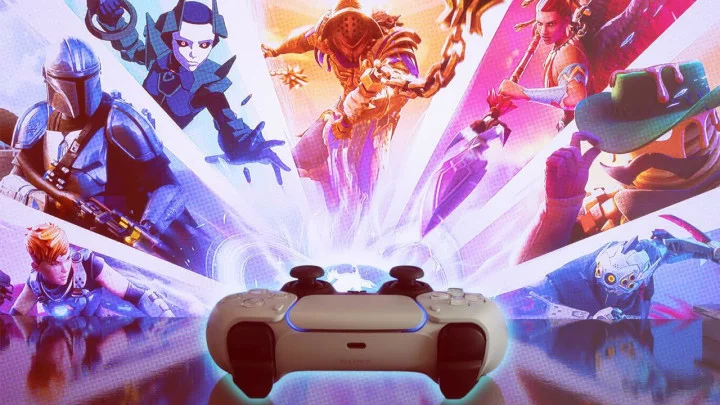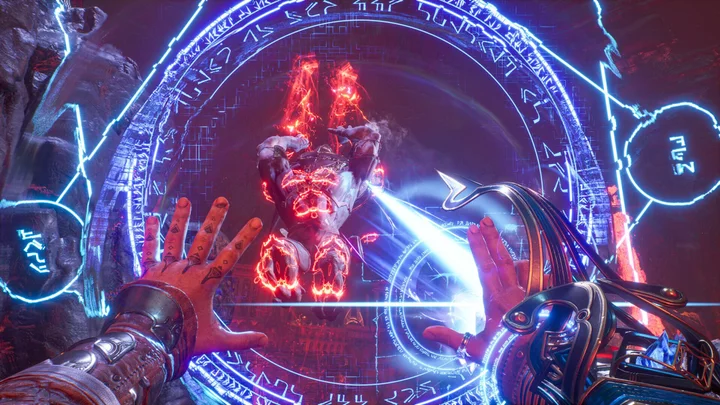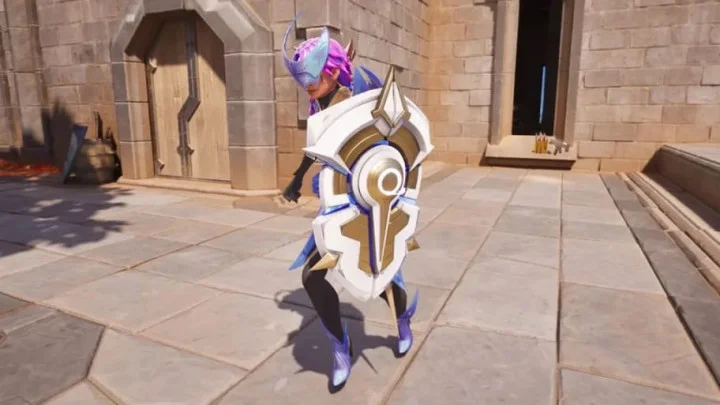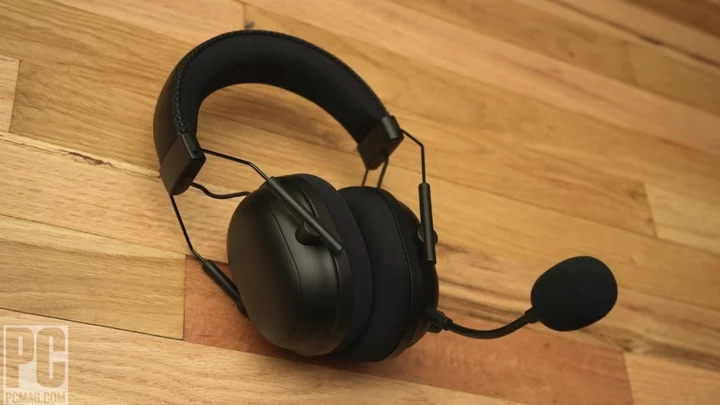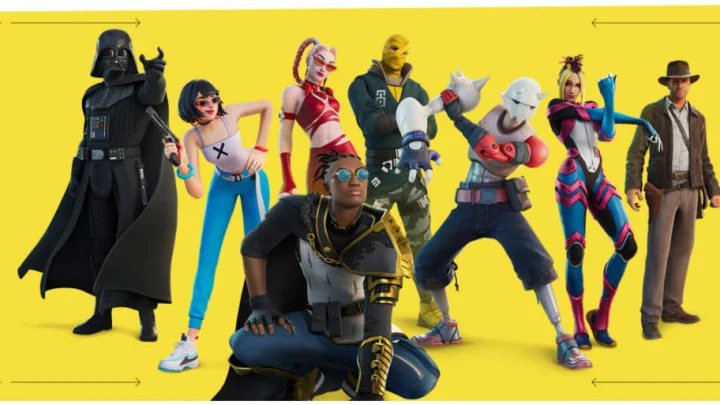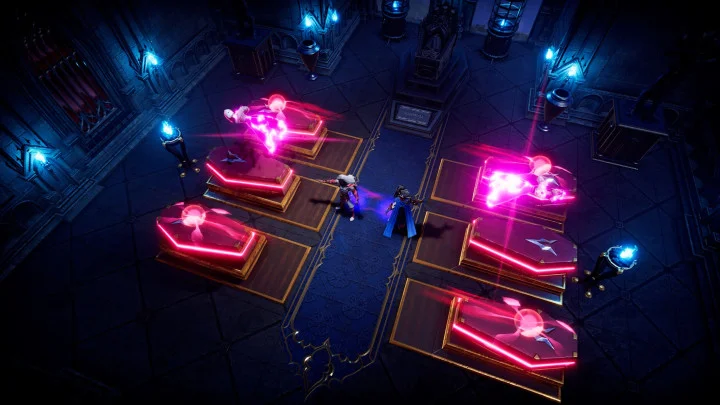Fortnite, the incredibly popular console, mobile, and PC game, has cemented itself as the premier battle royale game and defining free-to-play title.
Fortnite distinguishes itself with cartoon-style graphics and unique construction mechanics, but the premise is familiar. Your goal is to be the last person, squad, or team left alive in a round. That's easier said than done, of course, since each match includes 99 other players, all of whom have the same goal. Although the four-person Squad or 50 vs. 50 team modes dramatically reduce the number of enemy combatants, you still compete indirectly with your teammates to get the best score.
The best way to improve your Fortnite performance is to dive into the game for a few hours and get first-hand experience. Fortnite is more accessible than PlayerUnknown's Battlegrounds (PUBG), and you're likely to fare better without as much experience. Still, there's no harm in familiarizing yourself with some basic mechanics and strategies beforehand. Although we can't guarantee these tips will propel you to a first-place finish, following them will improve your chances. Luck, after all, determines many of the outcomes in these types of games.
If you have any secret paths to victory, feel free to leave a comment below!
Want more news, reviews, gear, and tricks to level up your game? Sign up for our gaming email newsletter.
Fortnite is available on a wide range of platforms, but you should make sure all your devices meet the minimum requirements if you plan to play everywhere. Check out the requirements below for each platform.
PC and Mac Requirements for Fortnite
To run Fortnite at minimum settings, Epic Games requires at least a 3.3 GHz Intel Core i3-3225 CPU, an Intel HD 4000 or AMD Radeon Vega 8 GPU, and 8GB of RAM. Fortnite has recently received a significant graphical overhaul with Chapter 4, making it a bit more taxing than previous versions. The recommended specs now ask for a 3.5GHz AMD Ryzen 3 3300U, Intel Core i5-7300U, or equivalent CPU; an AMD R9 280, Nvidia GeForce GTX 960, or equivalent DX11 GPU (with 2GB of VRAM); and 16GB of system RAM. For the best graphical fidelity, you want Epic-quality presets, which means even higher specs. Your PC will need an AMD Ryzen 7 3700x, Intel Core i7-8700, or equivalent CPU; AMD Radeon RX 6700 XT, Nvidia GeForce RTX 3070, or equivalent GPU (with 8GB of VRAM); and 16 GB of system RAM or higher.
Your computer must have the 64-bit Windows 10 or 11, or Mac OS Mojave 10.14.6. Note that Mac computers must support Metal API, and Fortnite no longer supports Nvidia cards on Apple platforms. Finally, Fortnite on Mac doesn't receive any of the latest Fortnite updates (the last playable version is 13.40).
For reference, Fortnite takes up about 41GB of disk space. We tested Fortnite on a Dell Inspiron 5675 gaming PC running Windows 10. The system features an AMD Ryzen 1700X CPU, AMD Radeon 580 8GB GPU, and 32GB of RAM. At the highest settings and 1080p resolution, the game ran at close to 70 frames per second according to the FRAPS tool.
Android and iOS Requirements for Fortnite
For Android users, Fortnite is compatible with devices running 64-bit Android on an ARM64 processor, Android OS 8.0 or higher, minimum 4GB of RAM, and GPU: Adreno 530 or higher, Mali-G71 MP20, Mali-G72 MP12 or higher.
Fortnite is not supported on the following iOS devices: iPhone 5S, 6, 6 Plus; iPad Air, Mini 2, 3; iPod Touch 6th gen and lower. Please note, however, that due to ongoing litigation between Apple, Epic, and Google, Fortnite is not available on the App or Google Play stores. This is also true for Macs. Fortnite no longer receives updates, version 13.40 is the last playable version on any Apple device. There are ways to circumvent this, but be aware that playing on these platforms requires extra steps. Read How to Play Fortnite on Android and iOS for more details.
Refer to Epic’s Fortnite FAQ for more detailed compatibility information among platforms.
PlayStation and Xbox Requirements for Fortnite
Xbox Series X, Xbox Series S, and all Xbox One consoles can run Fortnite, including the Xbox One X. You need Xbox Live to play online, but a free Silver account is sufficient.
PlayStation 5, and all models of the PlayStation 4 can run Fortnite. You don't need to be a PS Plus member to play the game, either. You can even cross-play with other platforms after Sony finally budged on the issue. Players can now use the same account across all platforms.
Nintendo Switch Requirements for Fortnite
Nintendo makes three versions of the Switch: the OLED, Switch Lite, and classic Switch. Fortnite’s single-player mode, Save the World, is not available to play on any version of Nintendo’s hybrid console, unfortunately. However, Battle Royale and Fortnite Creative are both available, and can be enjoyed for free. You do not need a Nintendo Online subscription to play with others, and the Nintendo version also supports cross-platform play, so you can build, shoot, and emote with people playing on all platforms.
If you're a Fortnite newbie, it's useful to watch the rest of the match after you're eliminated. Fortnite is a complex game, so you should expect to die quite a bit before you come to grips with its many systems. When you die, the game automatically switches to the perspective of whoever killed you. And when that player dies, it changes to the new killer's view. You can continue to hop between players up until the end of each match. It's tempting to launch into a new match immediately after you die, but the more time you dedicate to learning how to play Fortnite correctly, the more time (in the long run) you will spend actually in-game. Besides, if you leave a match early, especially any squad- or team-based modes, then there's no way find out how your compadres fared. A bit of moral support can go a long way. Check out the map at any time for an overview of the match and to locate teammates.
One benefit of staying with a match is that it forces you to pause and review the circumstances that led to your death. For example, we carelessly wandered into the open a few times, which made us an easy target for enemy players. You need to be overly cautious when moving between areas of cover, even if you feel like you are alone. Avoid confrontation early on, unless absolutely necessary.
Another advantage to sticking around until the end is that you can see how increasingly skilled players play the game. While many players may in fact just move around aimlessly hoping to avoid detection, others actually employ useful strategies. High level players make excellent use of Fortnite's construction mechanic, for example. A player we followed post-mortem repeatedly built structures around himself both for protection and to gain a better vantage point. Other times, he used existing structures and buildings as the foundation for larger-scale fortresses. This is a common strategy in team-based matches, as well; by the end of the game, the map is littered with impressive structures, some of which tower high into the sky.
Fortnite's construction system is one of the game's strongest aspects. Each player goes into battle with an ax (or similar tool) that they use to chop down and collect objects. Most of the environment is destructible, and hacking down everything from houses to vehicles to trees and rocks is endlessly satisfying. You don't run out stamina while scavenging, which is great, as is the fact that the game automatically adds the material to your inventory once you break them down. It's a quick and effective system. We also appreciate the sound design; you hear an increasingly higher-pitched tone with each ax swing as you get closer to destroying an object.
Objects break down into three main materials: wood, bricks, and metal. You have five slots for building objects, including a wall, square floor, pyramid, campfire, and stairs. You can construct items with any of the materials (with the exception of the campfire). Metal is the strongest material, followed by brick, and then wood.
Keep in mind that the stronger the material, the longer it takes to build. So, if you are in a tight spot and need immediate cover, building wooden barriers is your best bet. It's surprisingly simple to construct a building or makeshift shelter. Everything snaps together nicely, and it's easy to customize individual components should you need to add a window or door. You can also break down or move barriers if you accidentally start building in the wrong location.
Construction is one of the keys to advancing far into a match. Foremost, you can build ramps and steps to access areas you couldn't before. For example, if you see a weapon or health pack on top of a roof, this mechanic lets you reach it. If you are under fire, you can immediately build a shelter and try to wait out the threat. During later parts of the match, you can create a lookout post and watch for enemy movements. In team modes, constructing is even more important. If you are skilled enough to reach the center of the map with most of your team intact, building massive, protective shelters can greatly increase your chance of survival.
As with the rest of the environment, however, anything you construct can be destroyed by combatants with any sort of weapon. Take caution when another player fires a rocket or throws a grenade toward your base; either can cause everything to come tumbling down.
If building is a pillar of Fortnite's gameplay, shooting is its foundation. Your chances of survival plummet if you engage with someone while unarmed, so your priority should be finding a gun as soon as possible. You can fight off other players with your ax, but it only deals a small amount of damage. A pickaxe melee should only be a last-resort, as it is not a viable offensive option in most situations.
Collect as many guns as you can (your character has five item slots). First and foremost, it provides you with a range of attack options when you come across another player. A shotgun, for example, is much more effective in close quarters than a sniper rifle. Further, since it is difficult to hit moving targets, you are likely to run out of ammo quickly. Why find more bullets, when you can just as easily switch to another weapon? Also, if you pick up an extra gun and end up not using it, that's still one less gun in the hands of your enemy.
Be sure to stay up to date with Fortnite's latest developer updates. Epic frequently rotates its firearms in and out of a vault, so your favorite gun this season might get shelved in the next one. This also means that new players may be caught unawares when an unfamiliar weapon is in circulation again. The best way to get familiar with a new weapon is to use it. Pick up any new, menacing gear as you scavenge, and test its power against unsuspecting trees, houses, and hapless opponents.
If you do manage to kill other players, pick up all the loot they drop. Don't hesitate to take a better weapon or a much-needed health pack. If you deliberate too long on which items to collect, you become an easy target for anyone else in the area. And then the person who kills you gets double the loot. Never make it easy for your enemies.
As with PUBG, Fortnite's pace is controlled by an ever-constricting play area. In Fortnite, you must remain within the eye of a storm; if you don't, you take constant damage while in the hazard zone.
At set intervals, this eye gets smaller, and you must do your best to stay within its boundaries. This storm closes relatively quickly, so it can be difficult to get to safety if you fall behind the wall. If you sprint from one fallen player to the next, continuously stealing their health packs, it's possible to make it back, but you won't always be so lucky. It's all too common to lose pace and die from the storm, or get stuck behind some geography that makes it difficult to advance to safety.
That said, there is strategic value in timing your entry. If you are running for your life to reach the center of the storm, you become an easy target. Other players can easily detect and eliminate you, especially if the storm itself knocks down your health levels. Instead, plan to arrive at the barrier as it closes or right beforehand. Once safely inside, you can take a position with a good vantage point and return the favor.
Fall damage exists in Fortnite, so try to avoid falling from a great height (and don't jump to your doom, either). The game doesn't restrict the island boundaries, so you can fall off the side if you aren't careful. We had to test this at least once, and indeed, the game let us run off the side of a cliff. If you must, feel free to confirm this independently.
In any case, the structures you create probably pose a much greater threat, since you can ascend to dizzying heights in no time at all. It's all fun and games until you accidentally walk off your well-crafted tower. We lost count of the times we died by walking up a set of stairs before we finished building them. Also, other players can destroy any part of your structures, which can expose you to incoming fire or cause you to just drop out of the sky. Always make sure to reinforce shelters or at least have an exit strategy should your foundation fall out from under you.
In keeping with its off-kilter, creative theme, Fortnite's vehicles are similarly outlandish. Take, for example, the first vehicle Epic Games added to the game, the beloved shopping cart. This masterful metallic contraption comfortably sits two people; one in control of movement and the other in charge of protection.
Epic has deployed and vaulted numerous vehicles over the years, All Terrain Karts (ATKs), UFOs, Halo's Warthog, and even the Ornithopter from Dune. Larger vehicles seat up to four players, so your entire squad can travel as a group. You still need to stay vigilant, though, since big vehicles make for big targets. Like most other in-game objects, vehicles are destructible; an ax or gunfire can make quick work of them.
There are plenty of good reasons to risk getting behind the wheel. Vehicles are faster (and way more fun) than sprinting to a destination. This increased traveling speed comes in handy whenever you need to escape danger, overtake the pace of the closing storm, or travel quickly between locales to collect resources between stages.
Like most multiplayer games, Fortnite is more fun with friends or teammates. It’s difficult to stay motivated going up against 99 other players each play session, as you will likely die early and often. You should sample Fortnite’s other multiplayer modes instead, such as duos, trios, or squads. In the Duo mode, the game pairs you with another random player or you can add a friend. Trios and Squads mode supports up three and four player groups, respectively. Fortnite also gives you the option to group up with other random players, but of course, good teammates are hard to find.
Also, check out the 50 vs. 50 game type or whatever other modes Fortnite introduces, such as Teams of 20. In these massive team-based skirmishes, your first goal should be to find other people on your team. The more people you have watching your back, the better your chances of survival. Make sure any group you approach is actually on your side; running headfirst into a swarm of enemies is a quick path to death.
Building in team-based modes is also more chaotic, since you and your comrades can build sprawling protective shelters in no time at all. A large group of players can quickly break down and collect resources from even the most massive in-game structures.
Fortnite is a fast-paced and creative battle royale game, but not everyone can wrap their head around the building aspect. It's one of Fortnite’s most defining features, but the building nuances can prove overwhelming for newcomers. If you fall into that camp, or simply want a break from the normal Fortnite gameplay, Fortnite Zero Build offers all the action, scavenging, and terrain mastery of Battle Royale, sans building. It's just you, your wits, and whatever guns and power-ups you can scrounge during a match.
Zero Build makes a few changes to balance the gameplay around the action. It gives you a recharging shield for defensive purposes, since building is no longer an option. As a result, combat is a much more cover-focused affair, since you can’t magically spawn a wall to dampen incoming fire. All items, vehicles, and map details are the same as in Battle Royale. Likewise, you can also play Solo, Duos, Trios, and Squads, just like in Battle Royale. You earn XP towards your battle pass in this mode, making it a fine grind alternative if you have a genuine aversion to building structures.
Fortnite Creative is a unique, creation-focused toolset that you can independently download to create custom game modes and rulesets, and personalize your island. Up to 16 players can build or play together, giving you an entirely unique way to experience Fortnite. Note, however, that if you wish to publish and share with the community, you need to join the Support-A-Creator program. Otherwise, you're limited to building with friends.
Don’t fret if you don’t have much of a creative spark, or can’t get into the creator program. You can easily play community-developed modes. Publicly playable games have codes associated with them, so you can search and load up whatever piques your fancy. From shooting galleries, to prop hunts, to Among Us-like impostor knock-offs, there is no limit to community-created game modes you can play.
Epic has taken this creativity one step further with the recently introduced Unreal Editor for Fortnite (UEFN). You may also see this described as Creative 2.0. UEFN is an advanced version of the Creative system that harnesses the power of Unreal Engine 5 to give you a tremendous amount of control over the game world. You can import models, textures, and animations, and leverage an exhaustive collection of development tools to create maps and game modes quite different from what you'd find in Fortnite. Unlike Fortnite Creative, UEFN is a PC-exclusive tool.
Fortnite unapologetically leads the charge when it comes to the best and worst aspects of free-to-play gaming. On one hand, Epic Games does not charge you to play Fortnite, which is great. You can play and upgrade your character entirely for free, and paid items are purely cosmetic. How far you advance in a match largely depends on your luck and your skills.
The flip side of the free-to-play equation is the presence of microtransactions, seasonal battle pass grinding, and the deliberately designed fear of missing out (FOMO) that permeates everything about the Fortnite's monetization. Many gamers rightfully criticized Star Wars Battlefront II for its reckless launch-day pay mechanics, but free-to-play games with cash shops tend to slip under the radar by their very free-to-play nature. Buy these hot cosmetic outfits before they leave the shop! Grind XP for your battle pass rewards, or lose them at the end of the season! Fortnite's V-Bucks currency system doesn't help matters either, since its pay tiers are organized so that you almost always pay for more credits than you need for any one item. It's overwhelming by design, because that fear of missing out on something is too hard for many players, especially young ones, to shake off.
We recommend that you stop and think carefully before you put down any cash. Frankly, spending real money on digital cosmetics in a free game seems absurd. Know that whatever outfit or item you purchase in Fortnite will not make you a better player. And whenever the Fortnite fad ultimately ends, you won't get back any of that money you spent on such frivolities.
Parents, carefully monitor how your kids spend any V-Bucks you award them. It's okay for them to miss out on a skin every once in a while. And for goodness sake, it should go without saying that hiring a Fortnite coach for your child is an utter waste of money.
Remember folks, if Fortnite starts to get overwhelming or frustrating, it's okay to stop playing. Don't ignore your instincts. If you don’t really care about Fortnite all that much, we fully encourage you to find something else to occupy your time. Likewise, if the constant badgering to spend and grind gets to be too much, know that its okay to walk away. There’s no sense in continuing to play a game you aren't enjoying.
Read a book instead or go outside and exercise. Fitness trackers recognize all sorts of physical activities, including biking, running, swimming, and walking. Although it's important not to get unhealthily obsessed, you should also check out devices that encourage competition with friends.
If you remain steadfast in your goal to obtain a Fortnite victory, the only way to improve your chances is to consistently play. The more matches you join, the more likely you are to develop a coherent strategy and outrank opponents. After all, as the game matures and the growth of the player base slows, the players you encounter will also likely improve over time.
Still, even hundreds of hours of playtime, incredible luck, and a battle-tested strategy don’t guarantee a victory. You may need to spend significantly more time than you originally anticipated with the game, waiting for the perfect opportunity. If playing Fortnite ever becomes tedious, take a break. Unless you plan to play video games professionally or compete at some level, games should be a source of entertainment, not a daily commitment.

